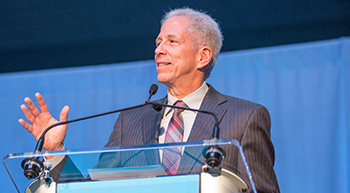-
Services
Featured Specialties
-
Locations
Location Type
-
Patients & Visitors

Robert Alpern, MD, dean of Yale School of Medicine, believes that the collaboration between the Genetics department and clinical departments will define new improvements in health and medical care.
"What sets Yale New Haven Health apart is our relationship with Yale School of Medicine, our access to translational research which brings new treatments to patients sooner, our broad range of specialized referral services, and our geographic reach," said Richard D'Aquila, YNHHS and YNHH president. YNHHS will continue to expand its ambulatory network strategy and expects to begin plans to replicate the Greenwich Hospital ambulatory center which opened in Stamford in August at both Long Wharf in New Haven and near the Connecticut/Rhode Island border.
D'Aquila and Robert Alpern, MD, dean of Yale School of Medicine, highlighted the 2017 plans for major clinical service lines:
Musculoskeletal: The service line will continue to grow as a unique center for orthopedic and spine surgery, rheumatology, movement disorders, physical medicine and rehabilitation. A new inpatient acute care unit will open on the Saint Raphael Campus in December. Next year, work will begin for a musculoskeletal minimally invasive surgical center at the former McGivney Center.
Neurosciences: Advances in neurosciences are quickly making their way to the bedside. The goal is coordinated care across the system, especially in the areas of stroke, Parkinson's disease and movement disorders, as well as new uses for deep brain stimulation.
Children's: A seventh Yale New Haven Children's Hospital Pediatric Specialty Center will open in Greenwich, along with emergency services for children. There will be an assessment of pediatric specialty services in eastern Connecticut and southern Rhode Island.
Women's: The growth in maternal and fetal medicine across the system will continue, and there is exciting new leadership in gynecologic oncology.
Behavioral Health: Areas of focus will include better linkages to the emergency departments, a more comprehensive approach to addiction services and new interventional treatments, such as electroconvulsive therapy and deep brain stimulation.
Heart and Vascular: This service line continues to grow at Bridgeport, Greenwich and Yale New Haven hospitals. During 2017, a network of heart failure programs will begin to be developed; cardiac surgery programs and vascular evaluation clinics will expand.
Smilow: This will be a leadership transition year; the Smilow ambulatory network will expand at L+M and Westerly hospitals and the new Phase 1 Clinical Trials Unit at 55 Park Street in New Haven will grow in usage.
Dr. Alpern spoke about genome sequencing advances and genomic health, using patients' genomic information, physiological and environmental factors to assess risk for disease and develop more targeted, effective treatments. Yale has been a pioneer in genetics since it established the first department of genetics in a U.S. medical school in 1972. A noteworthy culmination was the 2010 opening of the Yale Center for Genome Analysis at Yale's West Campus.
Through this department and its collaborations across the campus, Yale has advanced the understanding and treatment of hypertension, stroke, brain development, brain tumors, metabolic syndrome, polycystic kidney disease, dyslexia and macular degeneration to countless patients.
Genomics will be a major focus in the upcoming year, as was demonstrated in a video, Genomics Today: From Discovery to Clinical Applications.